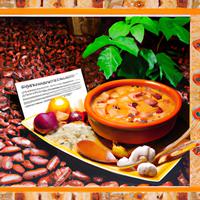
1 serving (100 grams) contains 143 calories, 9.0 grams of protein, 0.7 grams of fat, and 26.2 grams of carbohydrates.

Log this food in SnapCalorie

Nutrition Information
Calories |
286 | ||
|---|---|---|---|
% Daily Value* |
|||
| Total Fat | 1.3 g | 1% | |
| Saturated Fat | 0.3 g | 1% | |
| Polyunsaturated Fat | 0 g | ||
| Cholesterol | 0 mg | 0% | |
| Sodium | 482 mg | 20% | |
| Total Carbohydrates | 52.4 g | 19% | |
| Dietary Fiber | 19.2 g | 68% | |
| Sugars | 1.2 g | ||
| protein | 18.0 g | 36% | |
| Vitamin D | 0 mcg | 0% | |
| Calcium | 92 mg | 7% | |
| Iron | 4.2 mg | 23% | |
| Potassium | 872 mg | 18% | |
* Percent Daily Values are based on a 2,000 calorie diet. Your daily values may be higher or lower depending on your calorie needs.
Food Attributes
Source of Calories
About Pinto beans coocked
Pinto beans, a staple in Mexican and Southwestern cuisines, are small, speckled legumes known for their creamy texture and mild, earthy flavor. When cooked, they become tender and versatile, making them ideal for soups, stews, burritos, or as a standalone side dish. Rich in plant-based protein and dietary fiber, pinto beans are excellent for supporting digestion, heart health, and sustained energy. They are also a good source of essential nutrients like iron, magnesium, potassium, and folate. Naturally low in fat and free of cholesterol, they can be a healthy addition to most diets. However, preparation methods matter—adding excess salt, lard, or heavy cream can increase sodium and saturated fat levels, reducing their health benefits. For the most nutritious option, cook them from dried beans and season with herbs and spices. Pinto beans are a delicious, nutrient-dense choice for plant-forward or balanced eating.



